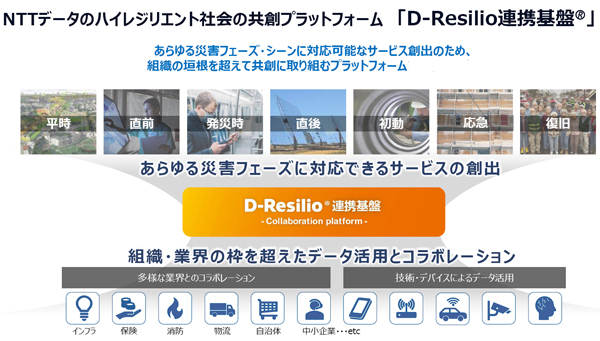NTT DATA’s Disaster Prevention DX Focuses on “Co-creation”

NTT DATA announced that the “Electricity Data Aggregation System” developed by Transmission and Distribution Systems LLC, which the company is involved in developing, has completed connection with all 10 general electricity transmission and distribution companies nationwide for its quick power data integration function, making it possible to provide power data nationwide within a few hours of acquisition.
This function enables the system to provide 30-minute power data acquired from smart meters to authorized municipalities and data utilization businesses that have completed the required procedures, several hours in advance. This is expected to not only speed up and enhance disaster response, but also improve peacetime services such as monitoring support and environmental protection.
NTT DATA is promoting disaster prevention DX with the keyword “co-creation.” Examples include electricity x disaster prevention DX and logistics x disaster prevention DX. The nationwide rollout of the quick power data function can be considered a milestone in the power x disaster prevention DX initiative.
Hiroaki Nakai, manager of the Mobility & Resilience Business Division at the company’s First Public Works Headquarters, said, “Currently, disaster damage is becoming more serious, but disasters have the unique characteristic of only occurring occasionally in certain areas. As a result, it is difficult for local governments involved in disaster response to accumulate experience and expertise. Amid a shortage of human resources and financial resources, public assistance is being pushed to the limits as they are overwhelmed with missions that go beyond their usual duties. The key to solving this issue is co-creation. We envision collaboration that transcends industrial boundaries, with the private sector complementing the role of the government.”
For example, by applying big data to local government operations and collaborating with industry partners to provide private sector expertise and on-site capabilities to local governments, they are considering reducing the burden on the field and creating a disaster-resilient society.
The electricity data aggregation system, deployed as part of the Electricity x Disaster Prevention DX, collects and stores information from smart meters and processes it into personal and statistical data. In the event of a disaster, the data is provided to local governments free of charge.
For example, when rescuing disaster victims, changes in electricity usage data can be used to estimate whether people were living in a house and which areas have the most people.
Rintaro Maruyama, chief of the Mobility & Resilience Business Division at the company’s First Public Works Headquarters, explains, “By utilizing electricity data, on-site personnel can determine the location of rescuers. Furthermore, by aggregating the electricity data acquisition status for each region on a mesh basis, it is possible to estimate which areas are experiencing abnormalities.”
Logistics x Disaster Prevention DX focuses on the stockpiling of supplies by local governments and companies. Currently, local governments, companies, and individuals each stockpile supplies separately, each feeling the burden of doing so from the perspectives of public assistance, mutual aid, and self-help.
To solve this issue, NTT DATA is exploring a framework for public-private partnerships to address both peacetime and disaster supply measures, including disaster preparedness stockpiles, which have previously been primarily promoted by local governments. As part of this, the company has concluded a comprehensive disaster prevention partnership agreement with Sagawa Express. The company plans to launch a commercial service related to a “disaster preparedness supply circulation system” during fiscal year 2014.
NTT DATA will be responsible for data collection and distribution related to supplies, while logistics companies such as Sagawa Express will be responsible for transporting and managing the supplies, promoting the stockpiling of supplies through public-private partnerships.
Nakai commented, “While the approaches to disaster DX differ between the electricity and logistics industries, we would like to advance disaster prevention measures based on co-creation.” He said he hopes to promote the “D-Resilio Collaboration Platform,” a co-creation platform developed by his company, as a foundation for connecting industries and co-creating disaster prevention DX, and to establish it as a business.
※Translating Japanese articles into English with AI
